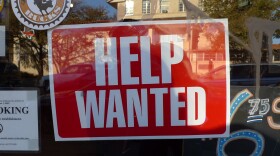It's a contentious issue in the upcoming election, and in the Granite State, politicians remain strongly divided. New Hampshire still has the lowest minimum in New England, at seven-twenty-five an hour. State leaders remain divided on how to increase wages without harming business and raising prices.
GUESTS:
- Charlie Arlinghaus - President of the Josiah Bartlett Center for Public Policy, a think tank in Concord.
- Jackie Cilley - Democratic State Representative from Strafford, and a former state Senator.
- Elaine Povich - Staff writer for Stateline, a publication of the Pew Charitable Trusts.
Highlights from today's show:
Charlie Arlinghaus and Jackie Cilley differ on the advantages and disadvantages of raising the minimum wage in the state, which is currently $7.25 an hour, but agree that data and economic research can be slippery.
Cilley refers to the article, "Doomsayers Keep Getting It Wrong on Higher Minimum Wages," which argues that opponents of increasing the minimum wage to $15 an hour were incorrect to assume that the move would harm the local economy.
Arlinghaus says research often reinforces both sides of the argument:
We look at different [results] and interpret them differently. I think the last time I debated this publicly, [the opposition and I] cited different economic studies [that proved our individual points].
George, a listener, points out that an increase in minimum wage may cause some workers to lose their eligibility for government benefits. Cilley calls this the "benefit cliff," caused by only a small increase in wages. In this situation, a person makes too much to qualify for benefits but not enough to thrive.
We ought to be talking about livable wages...we have to be careful about not harming the people we are trying to help.
Arlinghaus says that few people work at minimum wage jobs for long. However, if the minimum wage goes up, employers must adapt by employing fewer workers and shorter shifts.
Let's say you double the minimum wage...it would be a great thing for people who kept their job and got their wage doubled...but it would be a bad thing for people who got their hours reduced significanctly...The truth is: If you raise the price of anything, you get less of it.
Elaine Povich, who writes for Stateline, a publication of the Pew Charitable Trusts, says that voters tend to approve raising the minimum wage if the option is placed on a ballot, because more voters are working closer to the minimum wage line than far above it. As a result, businesses are increasingly agreeing to compromise with lawmakers in order to avoid large hikes in the minimum wage. One result: "Off-ramps."
California decided to look at this in a global sense: [lawmakers] wrote a law that says the minimum wage will go up in stages over the next five years, but if there are...measures of economic depression, then the Governor can basically say, 'Let's take an exit ramp here. Let's take a halt, let's get off the highway, stop for gas, and wait until the economy gets a little bit better.' So [he/she] freezes the wage wherever it is until the economy recovers a little bit.
Do our local experts like this idea of compromise in response to economic conditions? Arlinghaus does not, and says raising the minimum wage is the wrong approach whether or not the economy is healthy.
What you're doing [by raising the minimum wage] is reducing the ability of people to enter the market. And I want people to enter the market just as much in good times as in bad times.
Cilley cites another compromise that some states are trying: adjusting the rate of wage growth based on the size of a company, so that smaller companies have more time to raise their minimum wage without harming business. Of Arlinghaus's claim that a higher minimum wage reduces the number of jobs, she says:
I do think it is a bit of a scare tactic to say those low wage jobs are going to go away. The reality is that...guess what? [Companies have] been going to automation for the last few years, and that's accelerating.
Listener Susan said that raising wages has many possible benefits:
We cannot fill all the jobs we have right now! And this problem will increase as our population ages. It appears that in order to attract employees, there will have to be an increase in wages in New Hampshire It is also important to note that with the exception of the largest cities, it is VERY expensive to live in our communities and the wages paid (overall) make it very difficult to live in safe and comfortable homes. And lastly, we have a mismatch in skills for those jobs available. If we increase the minimum wage, our low wage workers might have some resources (time and money) to gain additional skills to improve their lot!
Povich says the complexity of the issue -- as illustrated during this Exchange show -- reinforces why so many states decide to compromise through the use of gradual changes, such as so-called off-ramps.







